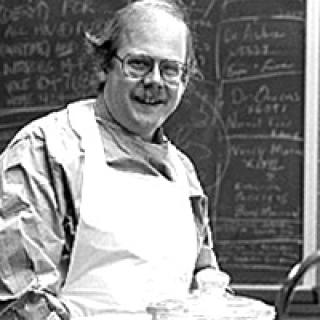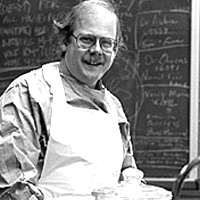
David E. Kleiner, M.D., Ph.D.
- Center for Cancer Research
- National Cancer Institute
- Building 10 - Magnuson CC, Room 2B44
- Bethesda, MD 20892
- 301-480-8487
- kleinerd@mail.nih.gov
RESEARCH SUMMARY
Dr. Kleiner is responsible for overseeing the clinical service component of the Laboratory of Pathology. The laboratory serves as the anatomic pathology service for the NIH Clinical Center, supplying surgical pathology, hepatopathology, autopsy, cytopathology, flow cytometry, ultrastructural pathology, and cytogenetic diagnostic services. These services include both routine diagnostic services and pathology support for the many clinical research protocols carried out at the NIH.Areas of Expertise
Research
Pathology of Chronic Liver Disease; Renal Transplant Pathology Dr. Kleiner is responsible for overseeing the clinical service component of the Laboratory of Pathology. The laboratory serves as the anatomic pathology service for the NIH Clinical Center, supplying surgical pathology, hepatopathology, autopsy, cytopathology, flow cytometry, ultrastructural pathology, and cytogenetic diagnostic services. These services include both routine diagnostic services and pathology support for the many clinical research protocols carried out at the NIH.
The Postmortem Pathology Section is responsible for conducting the autopsies performed at the Clinical Center. Any patient seen on protocol at the NIH or who has a disease of significant clinical or research interest to a particular principal investigator may have an autopsy done at the NIH. The goal of the service is to answer clinical questions about the patient's disease, to determine the cause of death, to provide for hospital and protocol-related quality assurance, and to serve as a research support for investigators who would like to use tissue from autopsies or carry out autopsy-based studies. The section is also responsible for training pathology residents in autopsy pathology. A weekly CME-approved clinical-pathological correlation conference is held in the autopsy suite to review the gross and microscopic findings on our cases. In addition to these administrative responsibilities,
Dr. Kleiner has significant service responsibilities as one of the full-time surgical pathologists. Although his area of expertise is in liver disease, he reviews all general surgical pathology material when on service. He reviews all liver biopsies at a weekly liver biopsy conference. Dr. Kleiner's other service responsibilities include immunohistochemical QA and supervising the laboratory computer system currently being installed. Dr. Kleiner's research interests are focused on chronic liver disease and on the transplantation pathology that is seen in novel immunosuppression regimens. Chronic liver disease is a significant health problem both in the United States and worldwide. In particular, chronic hepatitis C (CHC) has become recognized as a potentially serious chronic disease in the United States. Approximately one to two percent of the population is chronically infected with this virus and there is a wide variation in rate of disease progression. Some patients develop cirrhosis or hepatocellular carcinoma in less than 5 years while others may have chronic hepatitis for 40 years or more without significant morbidity.
The focus of Dr. Kleiner's research includes the objective evaluation of pathologic changes following therapy and prediction of disease outcome based on histological parameters. In the absence of an effective therapy or vaccine, it is important to be able to predict not only which patients may expect to benefit from therapy but also which patients are likely to progress more quickly to cirrhosis. Using a multivariate regression model, we have determined clinical and histologic factors that predict short-term progression of fibrosis.
Dr. Kleiner is currently participating in two multicenter clinical networks focused on non-alcoholic fatty liver disease sponsored by the National Institute of Diabetes and Digestive and Kidney Diseases. These two efforts: the NASH Clinical Research Network and the Longitudinal Assessment of Bariatric Surgery will provide both cross-sectional and longitudinal data that will allow evaluation of prognostic factors in fatty liver disease, which may be present 20 to 25% of the U.S. population. Dr. Kleiner is the reference pathologist for the Drug-Induced Liver Injury Network (DILIN). This is an NIDDK-sponsored clinical research network interested in prospective evaluation and investigation of drug-induced liver injury (DILI)is one of the main reasons for removal of drugs from the market. Dr. Kleiner performs blinded reviews for the network and provides information on liver injury classification and detailed histologic descriptive data that is being correlated with individual drugs.
Publications
Clinical and histological determinants of nonalcoholic steatohepatitis and advanced fibrosis in elderly patients
Liver stiffness increases acutely during sickle cell vaso-occlusive crisis
Modeling pathogenesis of primary liver cancer in lineage-specific mouse cell types
Association of IL28B genotype with fibrosis progression and clinical outcomes in patients with chronic hepatitis C: A longitudinal analysis
Case series: biliary leak after transjugular liver biopsy
Biography

David E. Kleiner, M.D., Ph.D.
Dr. Kleiner received his Ph.D. in 1986 in chemistry and his M.D. in 1988 from the University of Chicago. His graduate work focused on purification of Trichomonal secondary alcohol dehydrogenases, their kinetic characterization, and suicide inactivation. He came to the NIH as a resident in anatomic pathology and after completion of his training, he joined the surgical pathology staff where he has cultivated his interests in the pathology of liver disease, transplantation pathology, and the biochemical mechanisms of tumor cell invasion.
